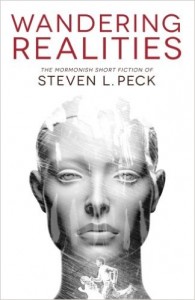 Review
Review
Title: Wandering Realities: Mormonish Short Fiction
Author: Steven L. Peck
Publisher: Zarahemla Books
Genre: Short Fiction
Year Published: 2015
Number of Pages: Kindle: 221
Reviewed by Liz Busby
This collection of short stories is divided into two sections, one for speculative fiction, one for realistic fiction. You would assume that I would enjoy the SF section more, given my tastes, but really, both sides are equally interesting. Every story contains some element that is uniquely Mormon, but none are superficial in their treatment. Even the funny stories like “When the Bishop Started Shooting Dogs” give pause to think about just how our church impacts our culture. This collection argues for the need for stories that are about Mormons, not simply mainstream fiction that happens to be by Mormons or deals with Mormon themes.
Some of my favorites from this collection:
“A Strange Report from the Church Archives” – A combination between “be careful what you wish for” and a fascinating alternate history. The rising confusion of the reader works perfectly and is resolved in a satisfactory way.
“Remade in His Image” – Very short, but interesting sci-fi about the implications of Mormon doctrines about the sanctity of the body.
“Two Dog Dose” – A mournful contemplation of aging and dementia that resolves in a way I didn’t expect. I got into an argument with my husband about the morality of the protagonist’s actions. A great portrayal of Mormon concerns surrounding death.
“The Best Pinewood Derby Ever” – Exactly what it says on the tin, this story is both nostalgia and wish-fulfillment for anyone who ever went through the whole Pinewood Derby process. I’m not personally sad to see scouting gone from the church, but certainly part of our cultural memory will be poorer for it.
“The Gift of the King’s Jeweler” – I haven’t ever seen anyone tackle the scriptural conundrum that this story takes on. I really enjoyed trying to guess exactly how it was going to connect up with the narrative in question. (Can’t say more for spoiler reasons.) This novella fits into the same tradition as Orson Scott Card’s Women of Genesis in trying to rationalize and expand the scriptural account.

One thought